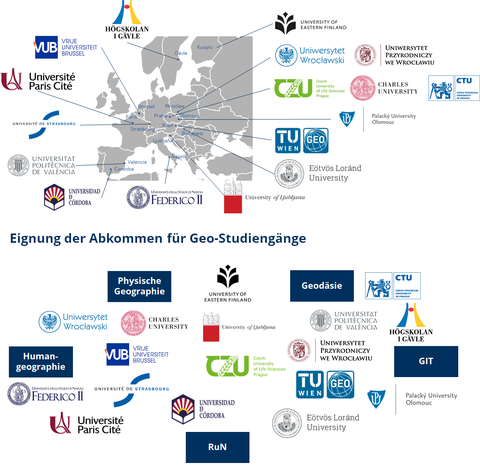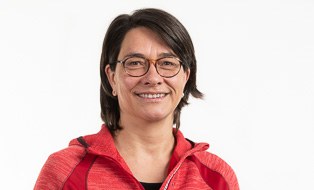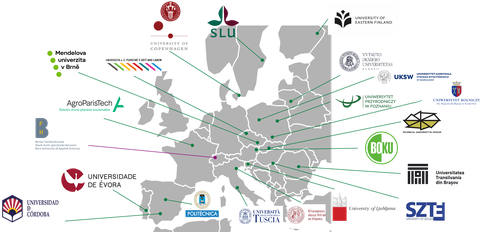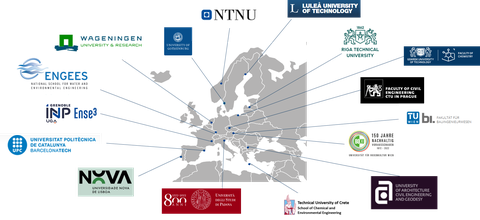Outgoings
Inhaltsverzeichnis
Informationen für Studierende, die „weg“ wollen.
Sie studieren an der Fakultät Umweltwissenschaften der TU Dresden und interessieren sich für einen ERASMUS-Aufenthalt an einer ausländischen Hochschule? Auf dieser Seite finden Sie Informationen zu den ERASMUS-Partnerabkommen der Fachrichtungen Forst-, Geo- und Hydrowissenschaften sowie zur Bewerbung.
Bitte beachten Sie die Informationen des ERASMUS-Büros der TU Dresden.
ERASMUS-Informationsabend
- Präsentation vom Info-Abend am 12.12.2024
- Präsentation vom Info-Abend am 07.12.2023
Partneruniversitäten
Im Rahmen des ERASMUS-Programmes können Sie Auslandsaufenthalte an verschiedenen Partneruniversitäten in Europa durchführen. Sollten Sie einen Auslandsaufenthalt außerhab Europas planen, finden Sie dazu weitere Informationen auf den Webseiten des Internationalen Büros: TUDweltweit
Die europäischen Partneruniversitäten im ERASMUS-Programm sind an der Fakultät Umweltwissenschaften nach Fachrichtung organisiert. Als Studierende eines bestimmten Studienganges können Sie sich auf die Abkommen der jeweiligen Fachrichtung bewerben:
- Abkommen der Fachrichtung Forstwissenschaften für Studierende der Studiengänge BSc und MSc Forstwissenschaften, MSc Tropical Forestry und MSc Holztechnologie und Holzwirtschaft
- Abkommen der Fachrichtung Geowissenschaften für Studierende der Studiengänge BSc und MSc Geodäsie und Geoinformation, MSc Geoinformationstechnologien, BSc und MSc Geographie
- Abkommen der Fachrichtung Hydrowissenschaften für die Studiengänge BSc Hydrowissenschaften, MSc Abfallwirtschaft und Altlasten, MSc Hydrobiologie, MSc Hydrologie, MSc Wasserwirtschaft und MSc Hydro Science and Engineering
- Studierende des Studienganges MSc Raumentwicklung und Naturressourcenmangement können sich auf die Abkommen aller Fachrichtungen bewerben.
- Sie können auch ein Partnerabkommen einer anderen Fachrichtung nutzen (z. B. als Studierende der Geowissenschaften ein Abkommen der Forstwissenschaften), wenn noch Plätze frei sind. Allerdings haben die Studierenden der jeweiligen Fachrichtung Vorrang bei der Auswahl. Sie sollten daher im Vorfeld mit der ERASMUS-Koodinator:in der jeweiligen Fachrichtung absprechen, ob eine Bewerbung für eine bestimmte Partnerhochschule aussichtsreich und inhaltlich sinnvoll ist.
Abkommen der Fachrichtungen
Eine detaillierte Übersicht aller Austauschplätze finden Sie im MobilityOnline-Portal.
Die Fachrichtung Forstwissenschaften bietet im ERASMUS-Programm Abkommen mit 21 Universitäten (in 16 Ländern). Bitte beachten Sie, dass nicht alle Abkommen für jeden Studiengang und -fortschritt gleich geeignet sind. Bitte informieren Sie sich auf den Internetseiten der Partneruniversität über das jeweilige Kursangebot.

Partneruniversitäten der Fachrichtung Geowissenschaften im ERASMUS-Programm
Die Fachrchtung Geowissenschaften bietet im Rahmen des ERASMUS-Programms Abkommen mit diesen Universitäten an. Bitte beachten Sie, dass nicht alle Abkommen für alle Studiengänge geeignet sind:
Mitteleuropa / Tschechien
- Palacký University Olomouc, https://www.upol.cz/, geeignet für BSc Geodäsie und Geoinformation, MSc Geodäsie, MSc Geoinformationstechnologien
- Czech University of Life Sciences University Prague, https://www.fzp.czu.cz/en, geeignet für BSc und MSc Geographie (Physische Geographie und Geoinformatik), MSc Geoinformationstechnologien, MSc Geodäsie sowie MSc Raumentwicklung und Naturressourcenmanagement
- Charles University Prague, https://cuni.cz/, geeignet für BSc und MSc Geographie
- Czech Technical University in Prague, https://www.cvut.cz/, geeignet für BSc Geodäsie und Geoinformation, MSc Geodäsie, MSc Geoinformationstechnologien
Mitteleuropa
- Eötvös Loránd University Budapest, Ungarn, https://www.elte.hu/en/, geeignet für MSc Geoinformationstechnologien
- Technische Universität Wien, Österreich, https://www.geo.tuwien.ac.at/, geeignet für BSc Geodäsie und Geoinformation, MSc Geodäsie, MSc Geoinformationstechnologien sowie MSc Raumentwicklung und Naturressourcenmanagement
- Uniwersytet Wroclawski, Wroclaw, Polen, https://uwr.edu.pl/en/, geeignet für MSc Geographie mit Schwerpunkt Humangeographie
- Wroclaw University for Environmental and Life Sciences, Wroclaw, Polen, https://upwr.edu.pl/, geeignet für BSc Geodäsie und Geoinformation, MSc Geodäsie, MSc Geoinformationstechnologien sowie MSc Raumentwicklung und Naturressourcenmanagement
Southern Europe
- Universidad de Córdoba, Spanien, http://www.uco.es/, geeignet für MSc Raumentwicklung und Naturressourcenmanagement, MSc Geoinformationstechnologien
- University of Ljubljana, Slowenien, https://www.uni-lj.si/, geeignet für BSc Geodäsie und Geoinformation, MSc Geodäsie, MSc Geoinformationstechnologien sowie MSc Raumentwicklung und Naturressourcenmanagement sowie MSc Geographie mit Schwerpunkt Physische Geographie
- Università degli Studi di Napoli Federico II, Neapel, Italien, http://www.unina.it/, geeignet für BSc und MSc Geographie mit Schwerpunkt Humangeographie, Stadtforschung
- Universitat Politècnica de València, Spanien, https://www.upv.es/, geeignet für BSc Geodäsie und Geoinformation, MSc Geodäsie, MSc Geoinformationstechnologien
Westeuropa
- Vrije Universiteit Brussel, Belgien, https://www.vub.be/, geeignet für MSc Geographie und MSc Raumentwicklung und Naturressourcenmanagement
- Université Paris Cité, Frankreich, https://u-paris.fr/, geeignet für BSc und MSc Geographie, MSc Raumentwicklung und Naturressourcenmanagement
- Université de Strasbourg, Frankreich, https://de.unistra.fr/, geeignet für BSc und MSc Geographie, MSc Raumentwicklung und Naturressourcenmanagement, MSc Geoinformationstechnologien
Nordeuropa
- Högskolan I Gävle, Schweden, https://www.hig.se/, geeignet für BSc und MSc Geographie, MSc Raumentwicklung und Naturressourcenmanagement und BSc Geographie mit Vertiefung / Spezialisierung Geoinformatik
- University of Eastern Finland, Finland, https://www.uef.fi/en, geeignet für BSc und MSc Geographie (mit Vertiefung / Spezialisierung in Physische Geographie oder Geoinformatik), MSc Geoinformationstechnologien, MSc Geodäsie, MSc Raumentwicklung und Naturressourcenmanagement
Häufig gestellte Fragen (FAQ)
Fragen zum Bewerbungsablauf
Empfehlenswert ist ein ERASMUS-Aufenthalt, wenn Sie sich die Grundlagen in Ihrem Studiengang bereits angeeignet haben.
Für Auslandsaufenthalte in den Bachelor- und Lehramtsstudiengängen müssen Sie zumindest das erste Studienjahr abgeschlossen haben. Ein Mobilitätsfenster ist in diesen Studiengängen im 4. bzw. 5. Fachsemester vorgesehen und in Ihrem jeweiligen Studienablaufplan ausgewiesen; wir empfehlen dieses Mobilitätsfenster zu nutzen. Für die Masterstudiengänge gilt diese Einschränkung nicht.
Ein ERASMUS-Aufenthalt ist auch noch möglich, nachdem Sie den Großteil Ihrer Studienleistungen bereits erbracht haben. Bedenken Sie aber, dass Sie mindestens 25 ECTS/Leistungspunkte im Ausland erbringen müssen. Wenn Sie schon die meisten ECTS in Ihrem Studium erbracht haben, können Sie Module auch zusätzlich belegen, allerdings werden diese nicht auf dem Zeugnis ausgewiesen. Der Erasmus-Aufenthalt kann unter bestimmten Umständen auch zum Anfertigen der Abschlussarbeit oder für ein Praktikum genutzt werden. Das Leonardo-Büro berät Sie für Praktika gern.
Eine aktuelle Übersicht über unsere Partneruniversitäten und mögliche Austauschplätze finden Sie im Mobility-online-Portal der TU Dresden:
- Austauschplätze der Forstwissenschaften in Mobility-online
- Austauschplätze der Geowissenschaften in Mobility-online
- Austauschplätze der Hydrowissenschaften in Mobility-online
Studierende sollten sich in erster Linie für Abkommen der eigenen Fachrichtung bewerben, d.h. Geodäse-Studierende für die Abkommen der Fachrichtung Geowissenschaften. Grundsätzlich sind aber auch fachfremde Bewerbungen möglich, z.B. können Hydrologie-Studierende die Abkommen des Fachbereichs Forstwissenschaften nutzen. Bitte besprechen sie fachfremde Bewerbungen mit den zuständigen Koordinator:innen. Jede Partneruniversität und jeder Studiengang hat ein eigenes Profil. Um einen geeigneten Platz zu finden, schauen Sie sich daher sorgfältig die Profile der jeweiligen Universitäten an.
- bis 28. Februar: Sie bewerben sich über das Mobility-online-Portal der TU Dresden. Auf diesem Portal werden Sie durch alle Schritte geleitet. Sie können einen Erst-, Zweit- und Drittwunsch für Ihren ERASMUS-Aufenthalt angeben. Für die Bewerbung benötigen Sie ein Motivationsschreiben, das sowohl Ihren Erst-, Zweit- als auch Drittwunsch beschreibt (Englisch oder Deutsch), Ihren aktuellen Lebenslauf, einen formlosen Sprachnachweis und einen Entwurf eines Learning Agreements. Bitte recherchieren Sie, ob Ihre Wunschuniversität besondere Sprachnachweise verlangt und legen Sie diese Ihrer Bewerbung bei bzw. schildern Sie im Motivationsschreiben, wie Sie diese bis zum Aufenthalt erwerben möchten.
- März: Die ERASMUS-Teams der Fachrichtungen wählen die Bewerber:innen aus und informieren Sie über die Auswahl. Sie nehmen die Platzauswahl in Mobility Online an oder lehnen diese ggf. ab.
- März/April: Der ERASMUS-Koordinator, die Erasmus-Koordinatorin nominiert Sie bei der Gastuniversität für Aufenthalte im Wintersemester oder für das gesamte Studienjahr.
- April – Juni: Sie werden von der Partneruniversität kontaktiert. Bei Verzögerungen nehmen Sie Kontakt zur Gastuniversität auf und informieren sich über die Regeln für die Immatrikulation.
- ab April: Nach der Förderzusage erstellen Sie Ihr Digitales Learning Agreement (DLA). Stimmen Sie sich dazu auch mit Ihrer:m Studienfachberater:in ab, vor allem, wenn Sie eine Anrechnung der erbrachten Studien- und Prüfungsleistungen anstreben. Das Learning Agreement muss durch den/die ERASMUS-Koordinator:in sowohl an der TU Dresden als auch der jeweiligen Gastuniversität digital unterzeichnet werden.
- ab Mai: Das International Office versendet die Förderverträge (Grant Agreement).
- August/September: Der ERASMUS-Koordinator, die Erasmus-Koordinatorin nominiert Sie bei der Gastuniversität für Aufenthalte im Sommersemester.
Bitte erstellen Sie Ihre Bewerbung im Dezember/Januar für das folgende Winter- und/oder daran anschließende Sommersemester. Die Bewerbungsfrist ist immer der 28.02. Eine Restplatzvergabe findet im September statt (Bewerbungsfrist ist dann 15.09.).
Für die Bewerbung benötigen Sie ein Motivationsschreiben, das sowohl Ihren Erst-, Zweit- als auch Drittwunsch beschreibt (Englisch oder Deutsch), Ihren aktuellen Lebenslauf, eine Notenübersicht, einen formlosen Sprachnachweis und einen Entwurf vom Learning Agreement. Füllen Sie im Learning Agreement Tabelle A aus. Das Learning Agreement muss zu diesem Zeitpunkt noch nicht von den ERASMUS-Koordinator:innen noch nicht unterzeichnet werden.
Bitte recherchieren Sie ob Ihre Wunschuniversität besondere Sprachnachweise verlangt und legen Sie diese Ihrer Bewerbung bei bzw. schildern Sie im Motivationsschreiben, wie Sie diese bis zum Aufenthalt erwerben möchten.
Für die Bewerbung benötigen Sie nur einen formlosen Sprachnachweis. Sprachzertifikate sind perfekt, aber es reichen auch Bescheinigungen von Sprachkursen, das Abiturzeugnis oder eine Selbsteinschätzung anhand Ihrer bisherigen Erfahrungen und Auslandsaufenthalte. Beachten Sie aber, dass die Partneruniversität für die Immatrikulation einen formalen Sprachnachweis/Sprachzertifikat verlangen kann. Bitte erkundigen Sie sich dazu selbstständig und rechtzeitig über die jeweiligen Regeln bei der Partneruniversität.
Als zuständige:n ERASMUS-Koordinator:in der TU Dresden wählen Sie in Mobility Online Ihre:n Koordinator:in der jeweiligen Austauschvereinbarung aus.
Die Entscheidung bei der Auswahl der Bewerber:innen beruht vorrangig auf einer Gegenüberstellung des Erstwunsches und der Anzahl der verfügbaren Plätze. Bisher konnte in den meisten Fällen dem Erstwunsch entsprochen werden. Sollte es mehr Bewerber:innen als Plätze geben, wird die Auswahl anhand des Motivationsschreibens, der Eignung des Wunschplatzes für den jeweiligen Studiengang (Nachweis anhand des Learning agreements), dem bisherigen Studienverlauf und auf Basis der Sprachnachweise getroffen. Bewerber:innen von Fremdfakultäten haben grundsätzlich eine geringere Priorität.
Fragen zur Vorbereitung des Auslandsaufenthaltes
Das Learning Agreement besteht aus zwei Teilen. Im ersten Teil tragen Sie alle Module oder Kurse ein, die Sie an der Gasthochschule belegen wollen. Sie müssen während des ERASMUS-Semesters mindestens 25 ECTS-Leistungspunkte (ideal 30 ECTS) erbringen. Im zweiten Teil tragen Sie Kurse Ihrer Heimatuniversität ein, die Sie ersetzen wollen. Sollten Sie nur Kurse im Wahlpflichtbereich angerechnet haben wollen, tragen Sie bitte "Wahlpflichtbereich" ein.
Bitte vermerken Sie, welche Module Pflichtmodule sind. Wenn Sie Pflichtmodule ersetzen wollen, sprechen Sie dies am besten mit Ihrer:m Studienfachberater:in und/oder ERASMUS-Beauftragten ab.
Wenn Sie sich keine erbrachten Leistungen anrechnen lassen wollen, lassen Sie den zweiten Teil bitte frei oder tragen "keine" ein. Eine automatische Anrechnung von Prüfungsleistungen ist an der Fakultät nicht möglich. Bitte füllen Sie den zweiten Teil des DLA entsprechend aus. Verwenden Sie z.B. folgenden Text: „I waive my right for advanced recognition. But I will still have the right for recognition after my mobility according to the internal rules of the TU Dresden.“
Eine Hilfestellung bietet Ihnen dieser Leitfaden des International Office mit detaillierten Informationen zur Erstellung des Learning Agreements.
Nach Ihrem Aufenthalt können Sie für erfolgreich absolvierte Module an Ihren zuständigen Prüfungsausschuss einen Antrag auf Anrechnung der erbrachten Studien- und Prüfungsleistungen stellen. Hierzu informieren Sie sich dazu auf den Webseiten des Prüfungsamtes oder bei der Studienfachberatung.
Sie können sich auch Bachelor-Kurse anrechnen lassen, sofern Sie noch nicht ähnliche Kurse an der TU Dresden belegt haben und die Kurse in Ihren Studienplan passen (z. B. Ergänzungsbereich). Dies besprechen Sie am besten mit Ihrer:m Studienfachberater:in.
Sie können als Bachelor-Student:in an einigen Universitäten auch Master-Kurse belegen (nach vorheriger Absprache). Diese können Sie sich entweder im Bachelor oder im Master anrechnen lassen.
Die gesamte Abwicklung zum Learning Agreement erfolgt digital (DLA). Nach der Förderzusage haben Sie über Ihren Workflow Zugang zum Digitalen Learning Agreement. Dort tragen Sie die Kurse ein und bestätigen diese. Danach erhält ihr Erasmus-Koordinator eine E-Mail um die Kurse ebenfalls zu bestätigen. Anschließend wird das Agreement automatisch zur Gasthochschule geschickt. Sollte Ihr Koordinator oder die Gasthochschule einzelne Kurse ablehnen, müssen diese ersetzt werden und der gesamte Vorgang beginnt von vorn.
Sollte das DLA aus technischen Gründen nicht funktionieren, kann übergangsweise noch mit einer pdf gearbeitet werden.
Im Fall von ERASMUS-finanzierten Auslandspraktika, die über das Leonardo-Büro organisiert werden, wird das Learning Agreement durch den Studiendekan/die Studiendekanin der Fachrichtung unterschrieben.
Das Learning Agreement muss zwingend vor Antritt der Reise von allen Seiten unterschrieben worden sein. Änderungen sind nach Antritt immer möglich.
Innerhalb der EU sind Sie durch Ihre gesetzliche Krankenversicherung geschützt. Da bei Behandlungen aber mit weiteren Zuzahlungen zu rechnen ist, ist eine private Auslandskrankenversicherung sinnvoll. Informieren Sie sich bitte rechtzeitig über die Leistungen Ihrer bisherigen (Auslands-)Krankenversicherung.
Eine Beurlaubung für den Auslandsaufenthalt im Rahmen des ERASMUS-Programmes ist nicht zwingend notwendig. Bei einer Beurlaubung wird der Auslandsaufenthalt nicht auf die Fachsemester angerechnet, obwohl sowohl an der Gastuniversität als auch an der TU Dresden während der Zeit der Beurlaubung Studien- und Prüfungsleistungen erbracht werden können. Über Vor- und Nachteile einer Beurlaubung lassen Sie sich bitte im Immatrikulationsamt beraten. Alle Informationen zur Beurlaubung vom Studium finden Sie auf der Homepage des Immatrikulationsamtes https://tu-dresden.de/studium/im-studium/studienorganisation/beurlaubung.
Sprachlich sollten Sie nicht nur in der Lage sein, im Gastland Ihr alltägliches Leben zu bewältigen, sondern Sie sollten Lehrveranstaltungen ohne große Schwierigkeiten folgen und Studieninhalte adäquat erarbeiten können. Besuchen Sie daher frühzeitig vorbereitenden Sprachkurse, z. B. werden im Rahmen der Sprachausbildung an der TU Dresden bis zu 10 SWS Fremdsprachenausbildung kostenlos angeboten (https://tu-dresden.de/studium/im-studium/studienorganisation/lehrangebot/sprachausbildung). Knüpfen Sie können Kontakte zu Studierenden aus dem Gastland, die derzeit an der TU Dresden studieren bzw. treten Sie gern in einen Erfahrungsaustausch mit anderen ERASMUS-Studierenden. Dies können Sie u. a. über das ERASMUS-Netzwerk der TU Dresden (https://www.esn-dresden.de), das Buddy Program (https://www.aegee-dresden.org/buddy/) oder das Kulturbüro des International Office (https://tu-dresden.de/studium/rund-ums-studium/kulturbuero). Hilfreich sind sicherlich auch die Erfahrungsberichte anderer ERASMUS-Studierender (https://tu-dresden.de/studium/im-studium/auslandsaufenthalt/erfahrungsberichte).
Die Anerkennung erfolgt in den Fachrichtungen unterschiedlich. Bitte informieren Sie sich auf den jeweiligen Seiten. Die automatische Anrechnung von Prüfungsleistungen ist an der Fakultät Umweltwissenschaften nicht möglich.
Prüfungsamt Forstwissenschaften
Prüfungsamt Hydrowissenschaften
Allgemeine Information zur Anerkennung finden Sie auch auf den Seiten des International Office.
Ansprechpartner im International Office
 © Michael Kretzschmar
© Michael Kretzschmar
Beratung zum Studium im Ausland
NameFrau Kerstin Unger M.A.
ERASMUS+ innerhalb Europas, Studierendenmobilität
Eine verschlüsselte E-Mail über das SecureMail-Portal versenden (nur für TUD-externe Personen).
Besuchsadresse:
Fritz Foerster Bau, Büro 158 Mommsenstraße 6
01069 Dresden
Postadresse:
Technische Universität Dresden International Office
01062 Dresden
Sprechzeiten:
- Dienstag:
- 09:30 - 11:30
- 12:30 - 14:30
- Donnerstag:
- 09:30 - 11:30
Keine Sprechzeit/Urlaub 10.03.26


